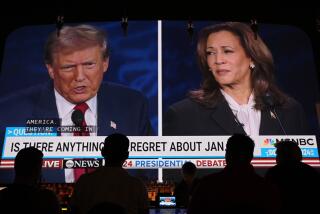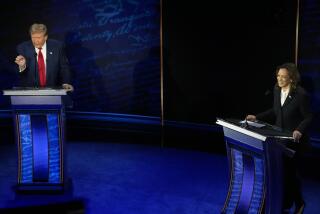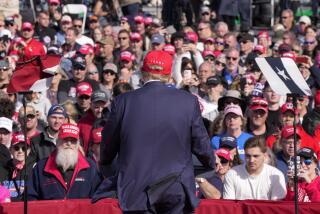Bush and Gore Campaigns Tally Up the Post-Debate Scores
- Share via
WEST CHESTER, Pa. — Wednesday on the presidential campaign trail and the post-debate truth squad was out in force:
Did Al Gore really visit Texas after a series of disastrous fires in 1998? Did Kailey Ellis, a Florida student Gore referred to during Tuesday night’s verbal battle in Boston, really have to stand up to fit into her overcrowded Sarasota science class?
Was Texas Gov. George W. Bush, formerly the campaign’s moneybags, really outspent by his Democratic rival? Was he right when he charged that Gore doesn’t advocate mandatory testing as an education reform?
And when is a sigh just a sigh?
Appearing on NBC’s “Today” show Wednesday morning, Gore was asked about complaints that his frequent sighing could be heard throughout the 90-minute debate--an allegedly impolite soundtrack to his Republican rival’s responses.
“Well, I guess sometimes the mike picks up your reaction to the other person, and I’ll try to be more careful on that,” Gore replied.
As Bush and Gore fanned out across battleground states Wednesday, hours after the first presidential debate of the century, actual campaigning took a back seat to heavy-duty critique.
Both campaign staffs let loose with a blizzard of debate-inspired e-mail spin, and the battling missives crossed paths in cyberspace: “Bush returns to personal attacks as polls show he lost debate.” “Gore makes up facts about TX fires.” Even Reform Party candidate Pat Buchanan, who was barred from debating, got into the act: “Buchanan: GW Bush betrays life.”
Campaigning in this Philadelphia suburb, Bush pounded Gore in much the same language he used during the University of Massachusetts debate, charging that the vice president would be “the biggest government spender we’ve seen in decades.”
Bush also accused Gore of trying to mislead voters into seeing his $1.3-trillion, 10-year tax cut plan as a giveaway to the rich. And he tried to raise new doubts about Gore’s integrity by calling attention to his inaccurate remark about visiting Texas wildfires in 1998 with James Lee Witt, the Federal Emergency Management Agency chief.
The Texas governor called the remark “part of a disturbing pattern.”
“I think I would have remembered it, but I took the man at his word,” Bush said. “Of course, it turns out he didn’t [visit with Witt]. This is a man who’s got a record, you know, of sometimes exaggerating in order to make a point.”
On Wednesday, Gore acknowledged during an interview on “Good Morning America” that his visit to Texas may not have been at the same time as Witt’s. But Gore added that he nevertheless had toured many disasters with the FEMA director--17 in eight years, according to his campaign.
“Well, I was there in Texas. I think James Lee went to the same fire,” Gore said. “If James Lee was there before or after, then, you know, I got that wrong then. But it was basically a compliment to the way our FEMA team had handled things. And it was in the context of a compliment to the governor for the way he handled it for the state of Texas.”
Karen Hughes, Bush’s communications director, said that when Gore is under pressure, he “simply makes things up.” One example, she said, was how crowded the Sarasota, Fla., schools are.
Sarasota High School Principal Dan Kennedy told a local radio station that the student whose father wrote Gore about her crowded science class, Kailey Ellis, was without a desk for only one day and could have sat on a lab stool.
In the debate, Gore said, “They can’t squeeze another desk in for her, so she has to stand during class.”
Ellis’ father defended Gore in an interview Wednesday, saying that Gore’s description of Kailey’s overcrowded classroom was accurate based on the information the vice president had been given.
Randy Ellis is a registered Republican who manages a waterfront restaurant in Sarasota and catered a crab cake lunch for Gore’s entourage. He had handed an article on the area’s crowded schools to a Gore aide before the vice president took off for Boston. The Sept. 10 article described Kailey’s crowded science classroom and a photo showed her standing.
Gore expressed his own concerns about the debate Wednesday, agreeing with an African American radio talk show host in Boston who observed that the exchange ignored many issues of importance to the black community.
“I will agree with you that the questions did not include a lot of the subjects that African Americans would have wanted to see added to the discussion,” Gore said. “And if they don’t come up in the next debate, I will personally bring them up and fit them in, whether they ask the questions or not.”
Gore did not, however, bust Bush on the Republican’s inaccuracies in the Tuesday debate. He could, for example, have disputed Bush’s characterization that the Democrat does not advocate mandatory testing as part of his education reform package.
Nor did he refute Bush’s inaccurate contention that the Clinton administration had failed to cut middle-class taxes as the president promised in 1992.
In fact, the 1997 balanced budget agreement contained a significant middle-class tax cut centered on children. As a result, the Congressional Budget Office has calculated that all but the most affluent families now pay a smaller share of their income in federal income taxes than they did when Clinton took office.
Perhaps Bush’s most significant misstep was his contention that he had been “outspent” by the Democrat. In fact, through Aug. 30, the Bush campaign had spent $121 million, twice as much as the Gore campaign, according to the Center for Responsive Politics, a nonpartisan research group.
On Wednesday, the Bush camp stood by Bush’s declaration: “This man has outspent me. The special interests are outspending me.”
Bush spokesman Scott McClellan said his boss was referring to a recent study showing that Democratic-leaning outside groups had spent $3.6 million on presidential campaign-related advertising--10 times more than Republican-leaning outside groups--from June 1 through Sept. 20.
However, that spending represented only a small fraction of the total spending by the presidential campaigns and the national political parties during the same period.
Campaigning in Warren, Ohio, Gore resumed his courtship of undecided voters Wednesday, telling thousands here that he wants to extend America’s prosperity to all, “not just a privileged few.”
He stopped at Youngstown State University, where he told a small group of students in the bookstore that his education agenda is more comprehensive than Bush’s.
One of Gore’s chief campaign strategists said the vice president refrained from responding to Bush’s attacks because “we’re convinced that swing voters do not want personal attacks.” He added: “If we’re wrong, we may lose the election.”
But Mark D. Fabiani, Gore’s communications director, drew a sharp difference between the two candidates. The timing of Gore’s post-fire trip to Texas is “a relatively minuscule issue . . . unless you’re incapable of talking about the big issues,” he said.
“Last night, the governor was incapable of defending his tax plan, of explaining his prescription drug plan,” Fabiani said. “We’re not surprised the day after the debate that he’s talking about the smallest insignificant details while the vice president is talking about the biggest issues facing the country.”
*
Times staff writers Michael Finnegan, Massie Ritsch, Edwin Chen and Megan Garvey contributed to this story.
(BEGIN TEXT OF INFOBOX / INFOGRAPHIC)
Who’s Outspending Whom
In Tuesday’s presidential debate, Texas Gov. George W. Bush said of Vice President Al Gore: “This man has outspent me. The special interests are outspending me.” Here’s how the numbers add up:
Total campaign spending (primary and general election) through Aug. 30:
Bush campaign: $121.4 million
Gore campaign: $60.8 million
Presidential advertising spending only, June 1 through Sept. 20:
Bush campaign: $13 million
Gore campaign: $8 million
Republican National Committee: $24.6 million
Democratic National Committee: $27.5 million
Republican-leaning groups: $334,000
Democratic-leaning groups: $3.6 million
Totals for ad spending only:
Bush: $37.9 million
Gore: $39.1 million
*
Sources: Center for Responsive Politics;
Brennan Center for Justice at New York University School of Law
More to Read
Get the L.A. Times Politics newsletter
Deeply reported insights into legislation, politics and policy from Sacramento, Washington and beyond. In your inbox twice per week.
You may occasionally receive promotional content from the Los Angeles Times.











